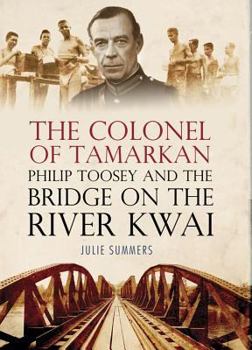The Colonel of Tamarkan: Philip Toosey and the Bridge on the River Kwai. Julie Summers
Select Format
Select Condition 
Book Overview
No Synopsis Available.
Format:Hardcover
Language:English
ISBN:0743263502
ISBN13:9780743263504
Release Date:January 2005
Publisher:Not Avail
Length:410 Pages
Weight:1.63 lbs.
Customer Reviews
2 ratings
What has been suppessed but not forgotten
Published by Thriftbooks.com User , 13 years ago
This book tells the story of the real British Colonel in charge of the British POW camp on the Death Railway in SE Asia including the building of the bridges on the Rive Kwai. The cruelty, brutality and downright sadism on the part of the Japanese guards described in this book have never been admitted by the Japanese government to their own people. Unlike the Australian government, the British government made life difficult for any British POW's to talk about events on the Death Railway or to receive disability pay. This book and "The Forgotten Highlander" by Alistair Urquhart, another survivor of the Death Railway and subsequent slave labourer in the coal mines and factories in Japan are a must read for folk today who have either forgotten or were not aware of the nastier side of WW II in the Pacific.
The story of an extraordinary man
Published by Thriftbooks.com User , 15 years ago
This is the real story of Philip Toosey, the British officer who saved hundreds of lives in Japanese WW II POW camps in Thailand. You must read this to understand the true story of "The Bridge on The River Kwai". However, this is not just the story of what Philip Toosey did in Thailand; this is a cradle-to-grave story of an extraordinary man. The author's accounts of his childhood and early adult life provide hints of the influence that his parents, his teachers, and his mentors and business associates have on his philosophy of life, a philosophy that is essential to his leadership of men in the POW camps in Thailand. Col. Toosey was a man who acted his conscience, stood up to the Japanese and Koreans (Korean guards in the POW camps) for his men, sometimes suffering beatings for them, and gained the respect of the Japanese camp leaders as a man who demanded, without compromise, that they abide by the international agreements on treatment of POWs. He was approachable by the lowest ranks and spent much time with his men who were dying of tropical and deficiency diseases and diseases caused by lack of hygiene, i.e., cholera and dysentery. After the war, he served on veteran boards, helped secure funding for a Liverpool hospital specializing in tropical diseases, and was finally knighted towards the end of this life. His men from the camps stayed in contact with him and he often helped them through financial and personal struggles. His death was hastened by nutritional deprivations he suffered during his imprisonment in Thailand. He even influenced one of the Japanese guards after the war. After Toosey gave the Japanese guard, Saito, a good report with the war crimes commission, Saito was freed without having to go through the tribunals. Saito changed his life philosophy, became a Christian, and communicated with Toosey in Toosey's later years. Sir Philip Toosey was a man in full, a man anyone would be proud to call friend, father, or countryman. If you're interested in WW II history, conditions in Japanese POW camps, and how one life can influence so many other lives in a positive and enduring manner, you must read this book.




